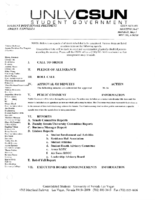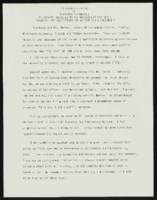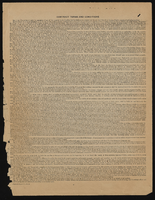Search the Special Collections and Archives Portal
Search Results

Meeting minutes for Consolidated Student Senate, University of Nevada, Las Vegas, May 01, 2006
Date
Archival Collection
Description
Text

"A Dream Fulfilled" speech by Roosevelt Fitzgerald
Date
Archival Collection
Description
From the Roosevelt Fitzgerald Professional Papers (MS-01082) -- Unpublished manuscripts file. Speech for 112th Founders Day celebration of Jackson State University.
Text
Maurine and Fred Wilson and William S. Park Audiovisual Collection
Identifier
Abstract
The Maurine and Fred Wilson and Dr. William S. Park Audiovisual Collection (approximately 1900s-1970s) consist of audiovisual material created by the Wilson and Park families. The materials depict the Park homes in Las Vegas, Nevada; Park and Wilson family members; outdoor activities and vacation trips to California, Colorado, and Mexico. The collection also documents early views of the Kiel Ranch in Las Vegas, Nevada, community parades and events, and early views of Las Vegas in the 1920s.
Archival Collection
Harvey's Lake Tahoe Hotel and Casino Collection
Identifier
Abstract
Collection is comprised of materials, dating roughly 1830-1995, from Harvey's Lake Tahoe Hotel and Casino Resort and the associated Harvey J. Fuller notes on casinos in Nevada. The bulk of the collection consists of paper inventories, Fuller's original notes, casino marketing materials, and casino and gambling merchandise. Also included are a number of artifacts and nineteenth and early twentieth century gambling machines.
Archival Collection
Barbara Raben Collection on the Las Vegas Jewish Community
Identifier
Abstract
The Barbara Raben Collection on the Las Vegas Jewish Community (1976-2018) is comprised of materials collected by Barbara Raben that document her personal life and her involvement with the Las Vegas, Nevada Jewish community, specifically the Hadassah Southern Nevada Chapter and the Jewish Family Service Agency (JFSA) of Clark County, Nevada. Hadassah and JFSA records consist of photographs and programs from events held by the organizations. Materials also document Raben's business, The Candy Factory, and her connections to the Florence Melton School of Adult Jewish Learning.
Archival Collection
Junior League of Las Vegas Records
Identifier
Abstract
The Junior League of Las Vegas Records (1940-2023) contain annual reports, fundraising information, training manuals, articles, minutes, photographs, scrapbooks, cookbooks, and other operational and working files that document the activities of the Junior League of Las Vegas (JLLV). Also included is documentation for advocacy projects the JLLV was involved with, such as Drug Abuse Resistance Education (D.A.R.E.), Safe Haven, the Ronald McDonald House, Read Aloud, and Literature Awareness Program for Children. Other records in this collection document JLLV's fundraising efforts such as the Repeat Boutique, Holiday Coffees, annual benefits, luncheons, and sales of their cookbooks. Also included are scrapbooks and issues of their newsletter
Archival Collection
MGM Mirage Corporation Records
Identifier
Abstract
The MGM Mirage Corporation Records date from 1970 to 2010 and consist of the records of the Las Vegas, Nevada based global entertainment company. The collection contains organizational records, employee newsletters, files about the MGM Mirage diversity and inclusion initiative, correspondence, reports on gambling addiction, gambling statistics, press clippings, and audiovisual materials. There are also photographs, photographic slides, and photographic negatives of performers, corporate executives, and MGM Mirage properties.
Archival Collection
Robert Woodruff Photograph Collection
Identifier
Abstract
The Robert Woodruff Photograph Collection (1900s-1970s) consists of ninety-seven black-and-white photographs of locations and events in Clark County, Nevada. Locations include Las Vegas, Henderson, and Searchlight, Nevada, as well as the Hoover Dam. The majority of the images were taken between 1934 and 1962.
Archival Collection


